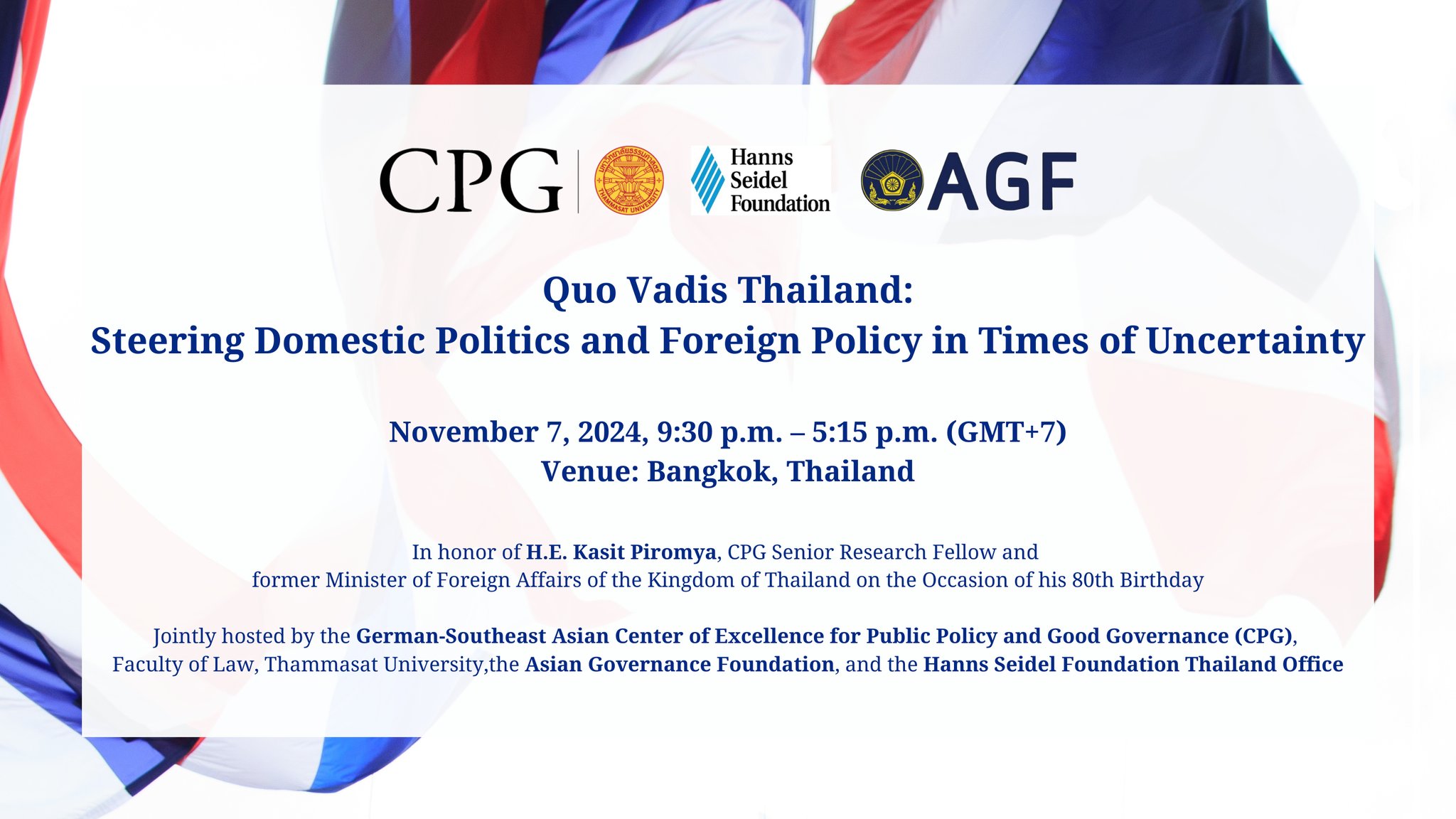On November 7, the HDFF team attended the conference “Quo Vadis Thailand: Steering Domestic Politics and Foreign Policy in Times of Uncertainty”, held in honour of H.E. Kasit Piromya, CPG Senior Research Fellow and former Minister of Foreign Affairs of the Kingdom of Thailand on the Occasion of his 80th Birthday.
Jointly hosted by the German-Southeast Asian Center of Excellence for Public Policy and Good Governance (CPG), Faculty of Law, Thammasat University, the Asian Governance Foundation, and the Hanns Seidel Foundation Thailand Office.
Following is a report from the second panel discussion.
Thai Foreign Policy between Agency and Constraints
The following is a report on the panel discussion from the conference on November 7, 2024, Quo Vadis Thailand: Steering Domestic Politics and Foreign Policy in Times of Uncertainty.
Moderator:
- Apichai Sunchindah, Policy Advisor & Development Specialist
Panelists:
- Thitinan Pongsudhirak, Prof. Dr., Faculty of Political Science, Chulalongkorn University
- Marc Saxer, Managing Director Office for Regional Cooperation in Asia, Friedrich Ebert Foundation
- Kavi Chongkijtavorn, Senior Fellow, Institute of Security and International Studies, Chulalongkorn University
- Dulyapak Preecharush, Assoc. Prof. Dr., Deputy Director, Institute of East Asian Studies, Thammasat University
1) A changing geopolitical landscape
The discussion covered Thailand’s role as a middle power within a shifting geopolitical landscape, especially with the recent re-election of Donald Trump as President of the United States. The panelists identified three major geopolitical theaters moving forward – Europe, the Middle East, and East Asia. In East Asia, they highlighted two significant challenges: the automation of cheap labor and the weaponization of supply chains, particularly in the technology sector.
2) Thailand’s unique advantages
Thailand possesses unique advantages in addressing these challenges. Panelists noted Thailand’s strong relationships with major powers, enabling effective engagement with both the People’s Republic of China and the United States. They also described Thailand as “geographically lucky,” positioned at the center of the Indo-Pacific and serving as a bridge between mainland and archipelagic Southeast Asia. Additionally, as a founding member of ASEAN, Thailand’s future is “fully embedded” with the regional organization.
The panel characterized Thai foreign policy as a “super-department store,” offering diverse strategic options, including its status as a middle power, an upper-middle income country, and its approach of maintaining “no permanent enemies.” The panelists also discussed Thailand’s approach to “bamboo diplomacy,” a strategy characterized by flexibility and adaptability in navigating great power rivalries.
3) Foreign policy constraints
Despite its advantages and flexibility, the panellists noted that Thailand faces significant challenges in formulating a coherent and effective foreign policy. One major obstacle is the ongoing domestic political instability, which hinders the development of a strong foreign policy direction. For instance, the authority of the Ministry of Foreign Affairs is often contested by other state organs, such as the military. The Thai Army, for example, maintains a stronger relationship with Myanmar than the Ministry of Foreign Affairs.
The panelists proposed that Thailand should position itself as a middle power amid intensifying great power rivalries. However, they observed that internal issues have diminished Thailand’s foreign policy “ambition.” To establish a comprehensive and consistent foreign policy agenda that benefits the Thai people and economy, the panelists emphasized the need for greater domestic political stability.


Comments are closed